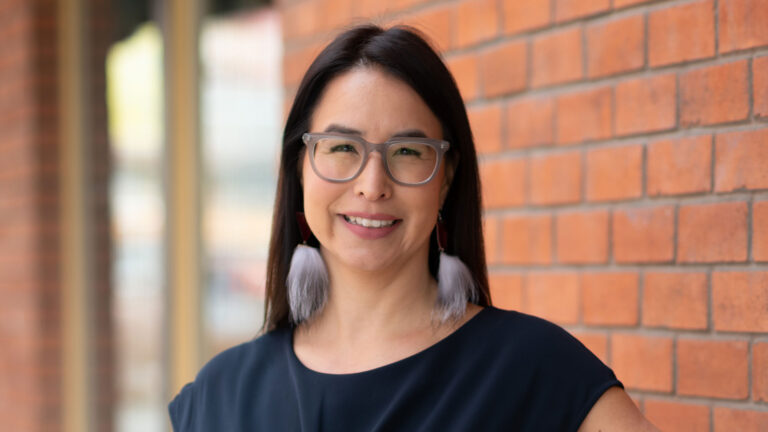
Morgan Bharadia is a Clinical Assistant Professor with the Faculty of Pharmacy & Pharmaceutical Sciences at the University of Alberta. She teaches Critical Analysis of Evidence in Practice and Patient Care Skills. One aspect of her teaching is the concept of deprescribing.
“When I graduated from pharmacy in 2015, I started working at the Royal Alexandra Hospital, primarily in the geriatric unit,” said Morgan. “Deprescribing was something that came up a lot in my practice. I did a lot of deprescribing myself when I got my additional prescribing authorization. I felt it was something that had a huge impact for patients, and it just became an area of interest for me. Now, it’s an area that I enjoy teaching.”
When she’s not educating pharmacist students, Morgan also practises in the Geriatric Outpatient Clinic at the Glenrose Rehabilitation Hospital in Edmonton. She feels there are a lot of opportunities for deprescribing—opportunities that often get overlooked. That’s why she feels it’s important to educate her students about the concept.
“When we think about deprescribing, as prescribers, we often think about starting a medication as the first thing that comes to our mind,” said Morgan. “But I think pharmacists can have a similar impact when reducing or stopping a medication. Deprescribing is essential for us to address actual or potential drug therapy problems and reduce adverse drug reactions for patients. The biggest opportunities for deprescribing exist with patients who have multiple health conditions and taking multiple medications, have renal impairment, are frail, have dementia, or are transitioning from hospital back to their community pharmacy.”
Morgan adds that pharmacists bring a unique lens—a medication lens—to solving a particular problem for a patient and deprescribing may play a role in the solution.
“For example, if a patient has a fall, each health professional looks at things differently,” she said. “A physical therapist might look into mobility issues. A physician might wonder about cardiac issues. As a pharmacist, we may wonder if any medications might have contributed to this. So, I think we really bring something valuable and unique. And, if we are asking ourselves whether a medication could be causing or contributing to a patient’s concern, we will find opportunities to reduce or stop the medication.”
When teaching future pharmacists about deprescribing, Morgan stresses that taking someone off a drug or reducing a dose for a drug is not as simple as it may sound. It requires the same level of assessment as starting someone on a medication.
“You require the appropriate knowledge about the patient’s health, involve the patient in the decision making, and think about how you’re going to do it,” she said. “Can you just stop the medication abruptly? Do you need to taper the medication? Are there non-pharmacological interventions that are needed? What education does the patient require? You need a clear monitoring and follow-up plan. Probably the most important aspect of deprescribing is communication and collaboration with other members of the healthcare team, including complete documentation.”
Morgan believes that learning about deprescribing in pharmacy school will provide future pharmacists with more skills and tools at their disposal and will make a significant difference for patients.
“I think it’s really important that students or pharmacists, anyone going out into practice, just consider that we aren’t just starting medications,” said Morgan. “We’re also there to stop inappropriate medications. I think deprescribing can help to prevent or manage serious adverse reactions, such as falls for seniors. It can help to reduce the pill burden and cost for the patient.”
When considering deprescribing, Morgan stresses to her students that they must take the time to look at patients as a whole, not just their health conditions.
“I find that patients really appreciate that,” she said. “A particular medication they are taking may not be a glaring issue right now, but it could cause issues later on. Maybe nobody else has talked to them about that medication for a while. Often after I talk to patients about these things, they admit they were wondering if they still needed those pills. They might be thinking about these things, but if we’re bringing deprescribing to the forefront of these discussions, you are able to fill that gap in care.”
By the time many of her students graduate, deprescribing will be an element of ACP’s new Standards of Practice for Pharmacists and Pharmacy Technicians. Morgan believes including deprescribing in the standards is important and will help start new pharmacists off on the right foot.
“It changes the language that we use,” said Morgan. “It changes the perception that we only have one way to make an impact as a prescriber by starting a medication. Also, providing clear direction for pharmacists in this area allows them to practise their skills more confidently—they know that deprescribing is within their scope of practice. This will give them that clear green light, as long as it’s appropriate.”




